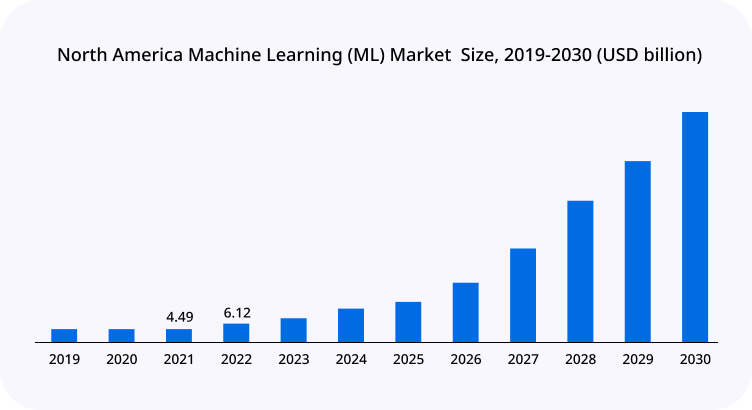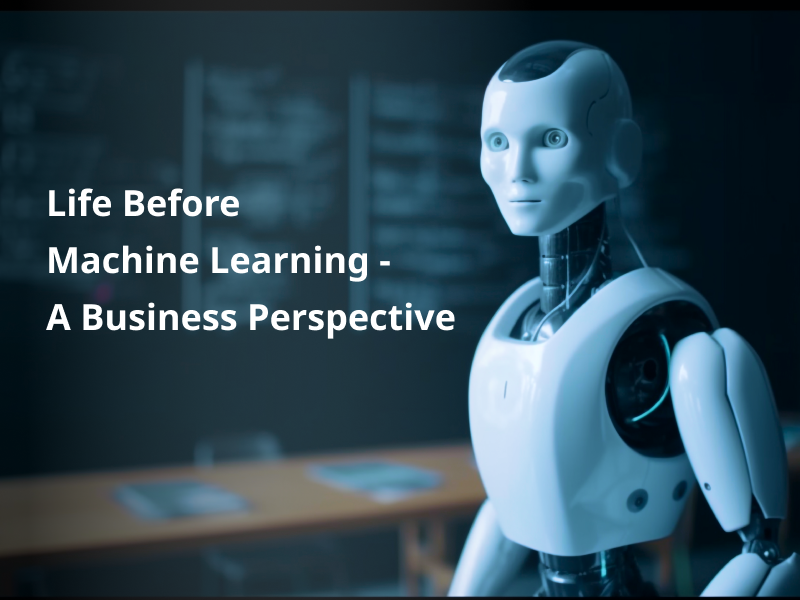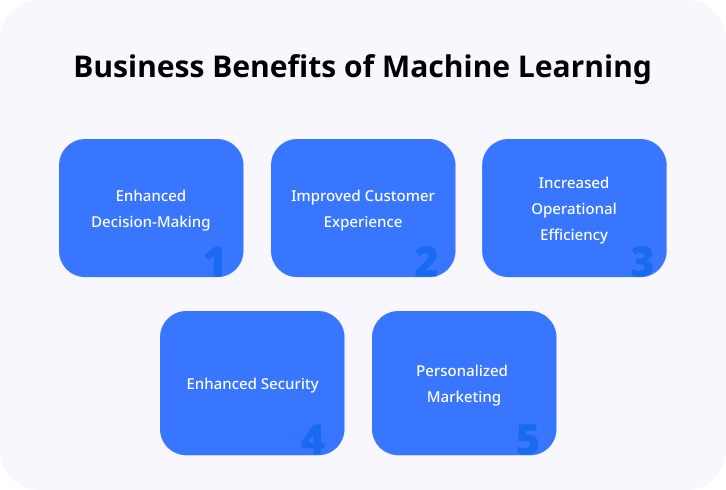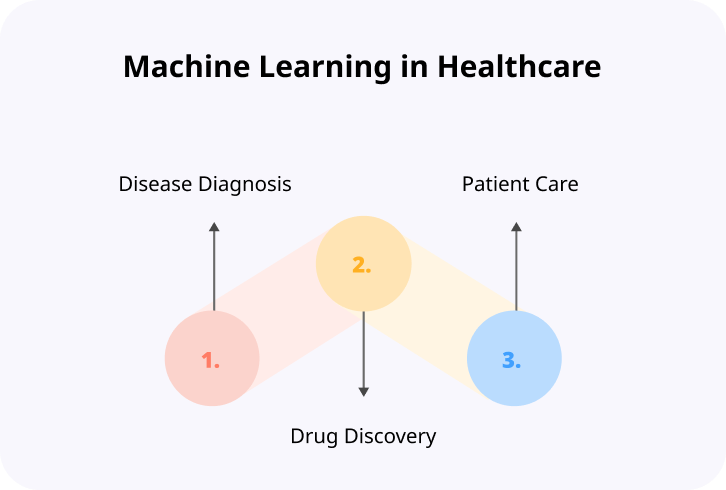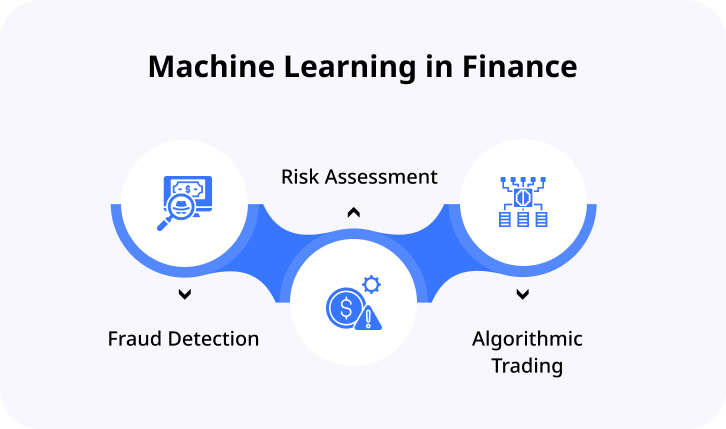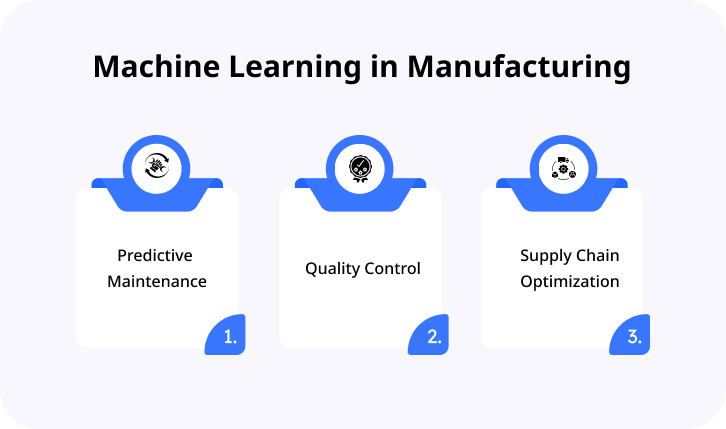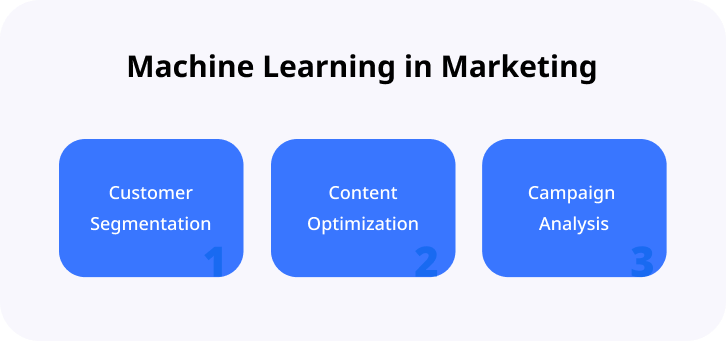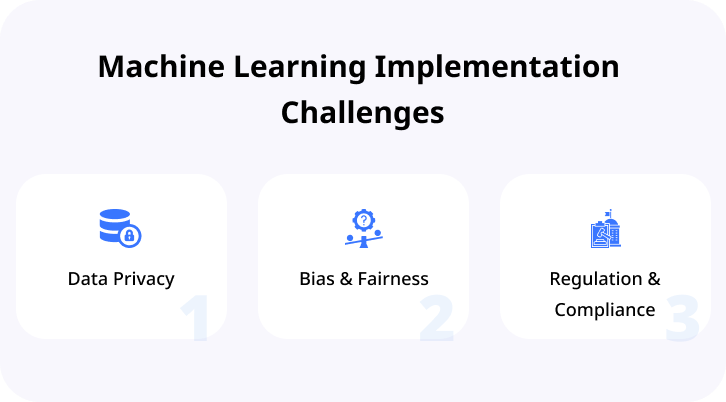Machine learning has become an indispensable force driving today’s business landscape. It is the engine that transforms data into actionable insights, paving the way for informed decisions and precise predictions.
Adnan Masood, Chief AI Architect at UST, a leader in digital transformation solutions, highlights its significance, stating, ‘Machine learning is beneficial for modern business.’
This remarkable technology has spread through various facets of business operations, spanning decision-making, maintenance, and service delivery.
The widespread adoption of ML is a testament to its transformative power. Across industries, developers and business leaders are seamlessly integrating ML into their operations, reaping its rich benefits.
So, let us discuss the profound impact of machine learning, exploring machine learning applications across diverse industries in detail.
Table of Contents
Machine Learning – A Market Overview
According to Fortune Business Insights, the global ML market reached $19.20 billion in 2022 and is projected to surge from $26.03 billion in 2023 to an impressive $225.91 billion by 2030.
This remarkable growth reflects a robust Compound Annual Growth Rate (CAGR) of 36.2% during the forecast period, highlighting the rapid expansion of the ML industry.
In 2020, as COVID-19 spread across the globe, many countries implemented quarantine measures and social distancing policies to curb its impact. Researchers and developers swiftly turned to innovative tools to assess the effects of these policies.
For instance, in April 2020, a Massachusetts Institute of Technology (MIT) team devised a model harnessing data from the pandemic. This model relies on advanced machine learning algorithms to predict the virus’s spread and assess the effectiveness of quarantine measures.
Let's shape your AI-driven future with our consulting services.
The development of such models underscores the growing demand for advanced ML capabilities in tackling critical challenges.
Let’s have a look at the latest trends-
Life Before Machine Learning – A Business Perspective
Before the era of Machine Learning, businesses grappled with several challenges that hindered their growth and efficiency. These challenges stemmed from the limitations of traditional data analysis methods and included the following:
Manual Data Analysis
In the pre-Machine Learning era, businesses relied heavily on manual data analysis. Analysts had to spend extensive hours poring over data, making it a slow and error-prone process. It led to delayed decision-making and a higher risk of inaccuracies.
Limited Data Processing
Traditional data analysis tools had limitations in processing vast datasets. Businesses often had to work with sample data, missing out on valuable insights that could be derived from analyzing the entire dataset.
Lack of Real-time Insights
Obtaining real-time insights was a challenge. Businesses struggled to make immediate decisions based on changing market conditions or customer behavior, as data processing took considerable time.
Incomplete Understanding of Customer Behavior
Without Machine Learning, businesses had difficulty in comprehending complex customer behavior patterns. It hindered their ability to provide personalized services and recommendations.
Inefficiency in Predictive Analysis
Predictive analysis was cumbersome. Traditional methods could not effectively predict future trends, leading to sub-optimal inventory management and resource allocation.
Human Error & Bias
Manual analysis was prone to human errors, and personal biases could influence decisions. It impacted the accuracy and objectivity of decision-making processes.
How can Machine Learning benefit Businesses?
Machine Learning offers businesses many advantages that can significantly impact their operations and growth. Here are five key benefits of incorporating ML into business processes:
Enhanced Decision-Making
Machine Learning empowers businesses with data-driven decision-making. ML algorithms can provide valuable insights by analyzing vast datasets, helping organizations make informed choices.
For instance, Netflix uses ML to recommend personalized content to viewers based on their past preferences, increasing user engagement.
Improved Customer Experience
Machine Learning applications enable businesses to deliver a tailored customer experience. Chatbots, powered by ML, offer 24/7 customer support, resolving queries promptly.
For example, chatbots on websites like Shopify help customers navigate online stores efficiently, improving satisfaction and increasing sales.
From fraud detection to risk assessment, our AI-powered solutions offers endless possibilities in finance.
Increased Operational Efficiency
Machine Learning automates repetitive tasks, reducing the need for manual intervention. In manufacturing, predictive maintenance algorithms monitor equipment conditions and schedule maintenance when necessary, preventing costly breakdowns and downtime.
Enhanced Security
ML is instrumental in bolstering cybersecurity. Businesses can use ML to detect anomalies and potential threats in real time.
For instance, financial institutions employ ML to spot unusual transaction patterns, identifying and preventing fraudulent activities.
Personalized Marketing
Machine Learning enables businesses to create highly targeted marketing campaigns. Retailers like Amazon utilize ML to analyze customer behavior and preferences.
It helps recommend products more likely to resonate with individual customers, increasing sales and customer loyalty.
The Underlying Mechanism
Have you ever wondered how machines can learn and make predictions seemingly independently?
Machine Learning might appear magic, but it is a blend of sophisticated algorithms, data-driven training, and neural networks working in sync. Let us explore the inner workings of this technology.
Algorithms: The Building Blocks
At the heart of Machine Learning lies a set of algorithms and mathematical recipes designed to sift through data, identify patterns, and make decisions. These algorithms act as the brains behind ML, taking in data inputs and generating predictions as outputs.
Training the ML Brain: Data is the Key
One of the remarkable aspects of ML is its ability to learn from data. ML models require extensive datasets comprising historical information to understand the relationships and trends within the data.
This process is like teaching a child; the more examples it’s exposed to, the better it learns.
The Neural Network Connection
ML systems employ neural networks when it comes to complex tasks like image recognition or natural language processing. The human brain’s structure inspires these networks and consists of interconnected artificial neuron layers.
They excel at capturing intricate patterns and nuances within data.
How ML Learns and Predicts?
ML model diligently studies the data, discovers patterns, and remembers them. When faced with new data, the model applies its learned knowledge to make predictions. It’s a continuous cycle of learning, adjusting, and predicting at lightning speed.
For example, in a spam email detection system, the ML model identifies patterns in thousands of emails during training, learning to distinguish between spam and non-spam content.
When you receive a new email, the model generalizes from its training to predict whether it is spam.
Top Applications Across Industries
ML has emerged as a transformative force, reshaping how industries operate and excel.
The following section showcases the top machine learning applications across various industries, unraveling the innovation, efficiency, and profound impact it brings to each domain.
Healthcare
Machine Learning applications are making significant strides in the healthcare sector, transforming how diseases are diagnosed, treatments are developed, and patient care is administered.
Applications:
- Disease Diagnosis: ML algorithms analyze medical images, pathology reports, and patient records to aid in disease diagnosis. For instance, ML can detect anomalies in radiology in X-rays, CT scans, and MRIs.
- Drug Discovery: ML accelerates drug discovery by predicting the effectiveness of potential drugs and identifying new drug candidates. Pharmaceutical companies use ML to reduce the time and cost of drug development.
- Patient Care: ML-powered electronic health records (EHRs) assist healthcare providers in making informed decisions and delivering personalized patient care.
Examples:
One notable example is IBM Watson, which aids in cancer diagnosis and treatment recommendations by analyzing vast medical literature and patient data.
Also Read: An Insight into How Python is Used in Machine Learning
Finance
Machine Learning has revolutionized the finance industry, automating tasks, enhancing security, and improving decision-making processes.
Applications:
- Fraud Detection: ML algorithms analyze real-time transaction data to identify fraudulent activities and protect against cyber threats.
- Risk Assessment: Machine Learning assesses credit risk by evaluating borrowers’ credit histories and improving loan approval processes.
- Algorithmic Trading: ML-driven algorithms predict market trends, optimize trading strategies, and execute trades at lightning speed.
Example:
Companies like JPMorgan Chase and PayPal utilize ML for fraud detection, reducing losses, and ensuring secure financial transactions.
Retail
In the retail industry, Machine Learning is a game-changer, enabling businesses to understand customer behavior and streamline operations.
Applications:
- Demand Forecasting: ML predicts customer demand, helping retailers optimize inventory management and reduce excess stock.
- Customer Personalization: ML algorithms analyze customer data to offer tailored recommendations and personalized shopping experiences.
- Inventory Management: ML optimizes stock levels, reducing holding costs and ensuring products are always available when customers want them.
Examples:
Amazon’s recommendation engine is a prime example of ML, boosting sales by suggesting products based on customer preferences.
Manufacturing
The manufacturing sector benefits from Machine Learning by ensuring efficient production processes, product quality, and supply chain management.
Applications:
- Predictive Maintenance: ML models analyze sensor data to predict when equipment needs maintenance, reducing downtime and maintenance costs.
- Quality Control: ML identifies defects and anomalies in real-time during the manufacturing process, ensuring high-quality products.
- Supply Chain Optimization: Machine Learning optimizes supply chain logistics, reducing delays and minimizing transportation costs.
Example:
General Electric (GE) implemented predictive maintenance with ML, resulting in a 10% maintenance cost reduction and a 20% increase in efficiency.
Marketing
Machine Learning revolutionizes marketing by enabling data-driven decision-making and improving customer targeting.
Applications:
- Customer Segmentation: ML segments customers based on behavior and preferences, allowing businesses to tailor marketing campaigns.
- Content Optimization: ML analyzes content performance to suggest improvements, ensuring content resonates with the target audience.
- Campaign Analysis: ML provides real-time insights into marketing campaign effectiveness, enabling marketers to make adjustments on the fly.
Example:
Netflix employs ML algorithms to enhance its content recommendation system. By analyzing viewers’ historical data, including what they have watched and how they have rated content, Netflix’s recommendation engine suggests personalized content tailored to individual preferences.
It demonstrates the profound impact of ML on marketing strategies and user experiences.
Challenges & Ethical Considerations
As ML continues to transform industries, it brings unique challenges and ethical considerations that organizations must address.
Navigating these hurdles is crucial for harnessing the full potential of ML while ensuring responsible and ethical practices.
Challenges of Implementing ML
Data Privacy: ML relies heavily on data, often personal or sensitive. Protecting data privacy is paramount. Striking a balance between data access and privacy concerns is a challenge organizations face.
Bias & Fairness: ML algorithms can inherit biases present in training data. Addressing bias and ensuring fairness in decision-making processes is an ongoing challenge, particularly in applications like hiring or lending.
Regulation & Compliance: The ever-evolving regulatory landscape around AI and ML can be complex. Staying compliant with data protection and AI-specific regulations is a continuous challenge.
Importance of Ethical AI
Responsible Machine Learning: Ethical AI and responsible ML involve building systems that prioritize fairness, transparency, and accountability. It ensures that ML models do not inadvertently harm or discriminate against individuals or groups.
Trust & Reputation: Ethical AI practices build trust among users, customers, and stakeholders. Organizations that prioritize ethical considerations are more likely to maintain a positive reputation.
Long-term Sustainability: Embracing ethical AI is not just a short-term necessity but essential for the long-term sustainability of AI and ML initiatives. It reduces risks associated with legal consequences and public backlash.
Get Expert Help from PixelCrayons
When it comes to harnessing the full potential of Machine Learning (ML) in your business, partnering with experts is crucial. At PixelCrayons, one of the best machine learning companies, we bring over 12,500+ successful projects’ worth of experience. FSERVICES
Our ML services cover a spectrum of capabilities, including:
- Cognitive Insight
- Cognitive Engagement
- Cognitive Automation
- Data Mining
- Natural Language Processing
- Robotic Process Automation
Our team of IT professionals understands the intricacies of ML languages such as Python, R, and so on, ensuring that your projects are executed flawlessly. We work closely with you to identify your needs and tailor machine learning solutions for industries that drive results.
Whether you’re looking to enhance customer engagement, automate business processes, or extract valuable insights from data, we’ve got you covered.
With our track record of delivering cutting-edge ML solutions such as Shop With Us, Expense Management App, Health Tracking App, Invoicera, EATIGO, and Klyke, we are here to help you stay ahead in the ever-evolving technological landscape.
Streamline production, reduce downtime, and enhance quality with Machine Learning services.
Conclusion
The pervasive influence of ML across industries is undeniable. As industries continue to embrace this technology, we witness its potential realized in solving complex challenges and driving growth.
To stay ahead in this evolving landscape, businesses must harness the capabilities of machine learning development services. The journey has only begun, promising endless possibilities for those willing to explore its potential.


